
What are Cognitive Skills in Toddlers and How to Improve Them
What are Cognitive Skills in Toddlers and How to Improve Them
Cognitive skills in toddlers refer to the mental processes and abilities involved in thinking, learning, remembering, problem-solving, and understanding the world around them. These skills develop as children interact with their environment, explore new concepts, and engage in various activities. Here are some key cognitive skills in toddlers:
1. Object Permanence:
Object permanence is the understanding that objects continue to exist even when they are out of sight. Toddlers gradually develop this skill, realizing that objects don't disappear just because they can't see them.
2. Cause and Effect:
Toddlers start to recognize cause-and-effect relationships, understanding that certain actions can produce specific outcomes. They begin to explore and experiment with their environment to see the effects of their actions.
3. Problem-Solving:
Toddlers demonstrate problem-solving skills by finding solutions to simple challenges or puzzles. They use trial and error, logical reasoning, and sometimes creativity to solve problems and overcome obstacles.
4. Symbolic Play:
Symbolic play, also known as pretend or imaginative play, involves using objects or actions to represent something else. Toddlers engage in symbolic play when they pretend that a block is a phone or a stuffed animal is their baby.
5. Memory and Recall:
Toddlers start developing memory skills, both short-term and long-term. They can remember simple sequences of events, recall familiar people or objects, and show recognition of past experiences.
Toddlers begin to grasp basic concepts, such as colors, shapes, sizes, and numbers. They learn to differentiate between objects based on these attributes and can match, sort, or group items accordingly.
Toddlers demonstrate the ability to understand and follow simple instructions or questions. They comprehend basic vocabulary, phrases, and commands spoken to them.
Toddlers work on developing their attention span and focus. They become better at engaging in tasks, listening to stories, and staying involved in activities for longer periods.
These cognitive skills in toddlers provide a foundation for their future learning and intellectual growth. It's important to provide a supportive and stimulating environment, engage in age-appropriate activities, and encourage exploration and curiosity to nurture these cognitive skills.
Various Cognitive Skills in Toddlers As Per Age
Cognitive skills in toddlers develop gradually over time, and each child may progress at their own pace. Here's a general guideline for cognitive skills development in toddlers and some strategies to help improve them:
1. 0-6 months:
Cognitive skills: At this stage, infants begin to develop basic cognitive abilities, such as recognizing familiar faces and objects, responding to sounds, and tracking objects with their eyes.
How to improve: Provide a stimulating environment with contrasting colors, interesting sounds, and mobiles to encourage visual tracking. Talk to your baby, sing songs, and play gentle games like peek-a-boo to promote engagement and cognitive development.
2. 7-12 months:
Cognitive skills: Infants start to demonstrate object permanence, understand simple cause and effect, and engage in basic problem-solving, such as figuring out how to retrieve a toy hidden under a blanket.
- How to improve: Play hide-and-seek games with toys, encourage your child to find hidden objects, and introduce simple shape sorters or puzzles. Use repetitive actions and words during play to reinforce cause-and-effect relationships.
3. 12-18 months:
- Cognitive skills: Toddlers begin to explore their environment more actively, imitate actions, and engage in symbolic play. They can understand simple instructions and recognize familiar objects in pictures.
- How to improve: Provide toys that promote imaginative play, such as dolls, toy vehicles, or pretend kitchen sets. Encourage imitation by playing games like "Simon Says." Read books with simple stories and ask questions about the pictures.
4. 18-24 months:
- Cognitive skills: Toddlers develop a larger vocabulary, use two-word phrases, and demonstrate more advanced problem-solving abilities. They can match objects, sort shapes and colors, and complete simple puzzles.
- How to improve: Engage in conversations with your child, expand their vocabulary, and encourage them to communicate using simple sentences. Offer toys and activities that involve sorting, matching, and stacking. Introduce more complex puzzles or building blocks.
5. 24-36 months:
- Cognitive skills: Toddlers start to understand concepts like size, quantity, and basic counting. They can engage in pretend play with more elaborate storylines, follow multi-step instructions and ask questions.
- How to improve: Play counting games, sing number songs, and use everyday situations to introduce concepts like more/less, big/small, or empty/full. Provide opportunities for imaginative play with props and encourage storytelling.
Remember that these age ranges are approximate, and individual children may vary in their development. It's important to offer a supportive and stimulating environment, engage in activities that match your child's developmental level, and provide plenty of opportunities for exploration, play, and interaction.
10 Ways to Promote Cognitive Skills in Toddlers
1. Encourage exploration:
Provide a safe and stimulating environment where toddlers can freely explore and discover new things. Offer age-appropriate toys, books, and puzzles to engage their curiosity.
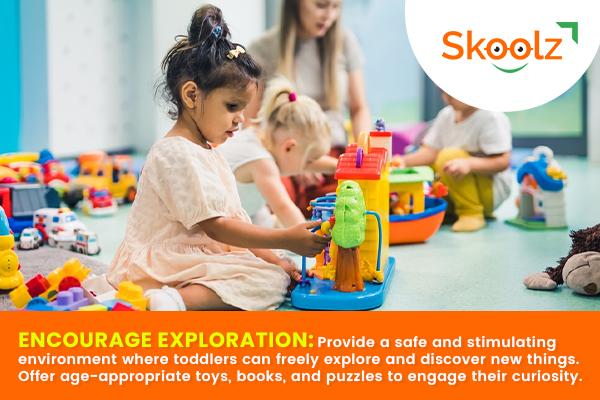
2. Play games:
Engage in simple games that involve problem-solving, memory, and critical thinking. Activities like shape sorting, matching, and building blocks can enhance cognitive skills.
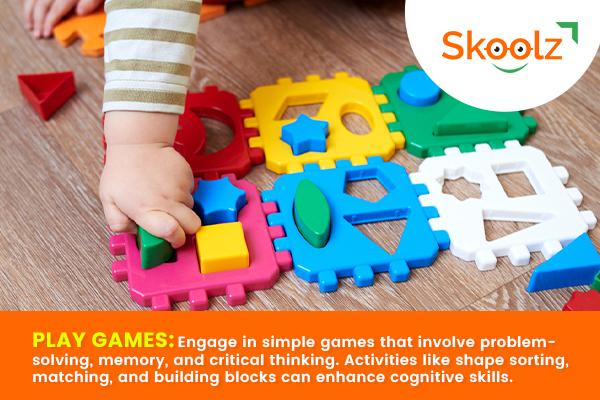
3. Read together:
Reading aloud to toddlers not only promotes language development but also enhances their cognitive abilities. Choose books with colorful pictures, simple stories, and interactive elements to capture their attention.
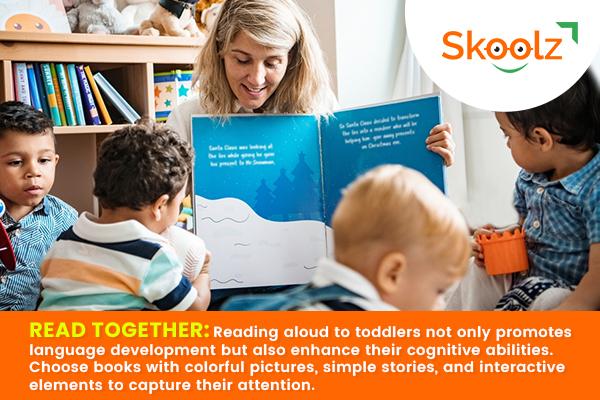
4. Encourage pretend play:
Pretend play allows toddlers to use their imagination and develop cognitive skills such as symbolic thinking and problem-solving. Provide props and encourage them to engage in imaginative scenarios.
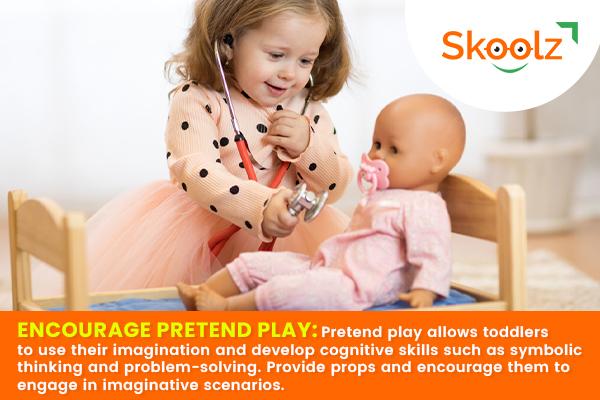
5. Provide open-ended toys:
Open-ended toys like building blocks, playdough, and art materials encourage creativity and problem-solving. These toys promote cognitive development as toddlers explore various possibilities and experiment with different outcomes.
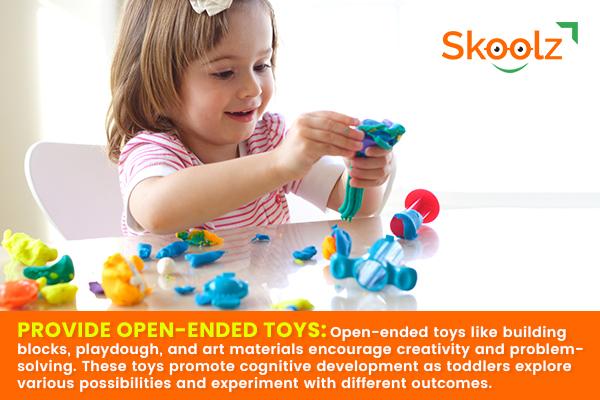
6. Teach categorization:
Help toddlers learn to categorize objects by attributes such as color, shape, and size. Provide opportunities for sorting activities, such as sorting blocks by color or grouping toys based on their characteristics.
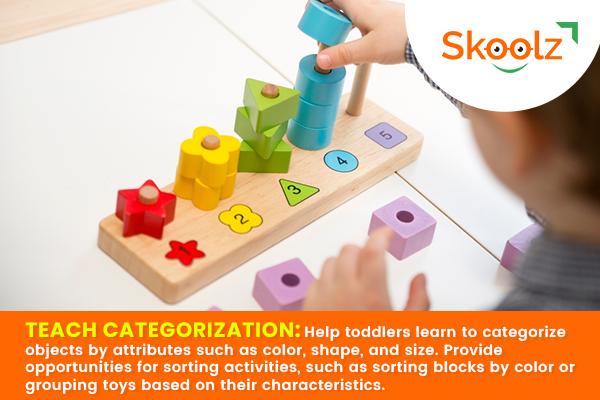
7. Foster curiosity:
Encourage toddlers to ask questions and explore the world around them. Provide explanations and engage in conversations that stimulate their curiosity and encourage them to think critically.
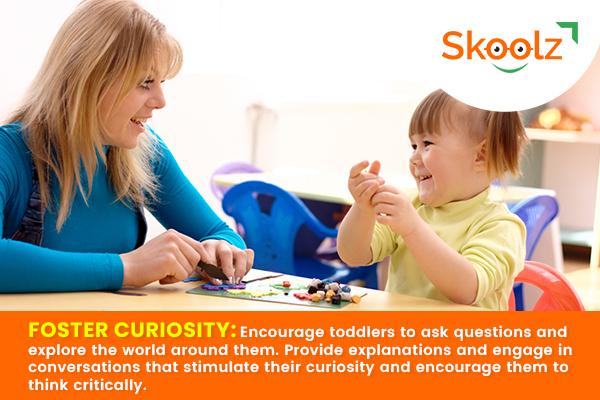
8. Engage in sensory activities:
Sensory experiences, such as playing with sand, water, or finger paints, promote cognitive development by stimulating the senses and enhancing problem-solving and creativity.
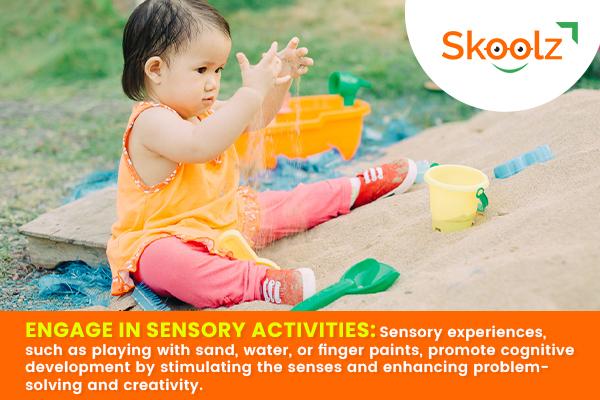
9. Provide opportunities for problem-solving:
Offer age-appropriate puzzles, riddles, and challenges that require toddlers to think critically and find solutions. Encourage them to approach problems from different angles and persist in finding answers.
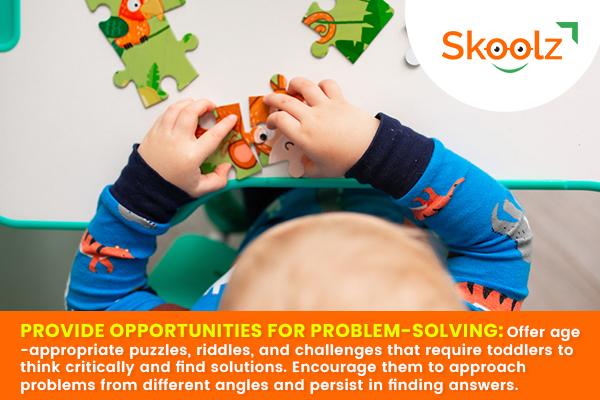
10. Limit screen time:
Excessive screen time can hinder cognitive development in toddlers. Set reasonable limits and prioritize hands-on activities, social interactions, and real-world experiences that promote active engagement and learning.
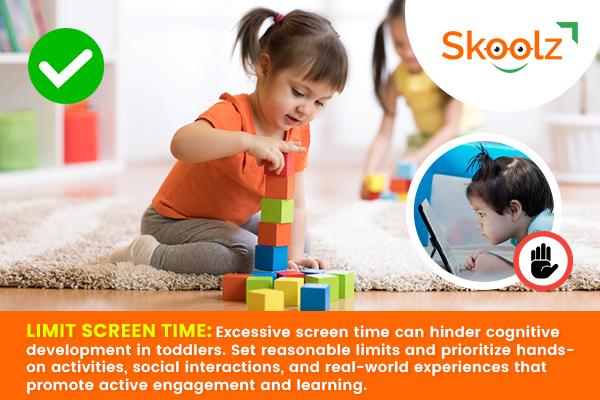

Bhawana Mohane
Digital Marketer

What are Cognitive Skills in Toddlers and How to Improve Them
Cognitive skills in toddlers refer to the mental processes and abilities involved in thinking, learning, remembering, problem-solving, and understanding the world around them. These skills develop as children interact with their environment, explore new concepts, and engage in various activities. Here are some key cognitive skills in toddlers:
1. Object Permanence:
Object permanence is the understanding that objects continue to exist even when they are out of sight. Toddlers gradually develop this skill, realizing that objects don't disappear just because they can't see them.
2. Cause and Effect:
Toddlers start to recognize cause-and-effect relationships, understanding that certain actions can produce specific outcomes. They begin to explore and experiment with their environment to see the effects of their actions.
3. Problem-Solving:
Toddlers demonstrate problem-solving skills by finding solutions to simple challenges or puzzles. They use trial and error, logical reasoning, and sometimes creativity to solve problems and overcome obstacles.
4. Symbolic Play:
Symbolic play, also known as pretend or imaginative play, involves using objects or actions to represent something else. Toddlers engage in symbolic play when they pretend that a block is a phone or a stuffed animal is their baby.
5. Memory and Recall:
Toddlers start developing memory skills, both short-term and long-term. They can remember simple sequences of events, recall familiar people or objects, and show recognition of past experiences.
Toddlers begin to grasp basic concepts, such as colors, shapes, sizes, and numbers. They learn to differentiate between objects based on these attributes and can match, sort, or group items accordingly.
Toddlers demonstrate the ability to understand and follow simple instructions or questions. They comprehend basic vocabulary, phrases, and commands spoken to them.
Toddlers work on developing their attention span and focus. They become better at engaging in tasks, listening to stories, and staying involved in activities for longer periods.
These cognitive skills in toddlers provide a foundation for their future learning and intellectual growth. It's important to provide a supportive and stimulating environment, engage in age-appropriate activities, and encourage exploration and curiosity to nurture these cognitive skills.
Various Cognitive Skills in Toddlers As Per Age
Cognitive skills in toddlers develop gradually over time, and each child may progress at their own pace. Here's a general guideline for cognitive skills development in toddlers and some strategies to help improve them:
1. 0-6 months:
Cognitive skills: At this stage, infants begin to develop basic cognitive abilities, such as recognizing familiar faces and objects, responding to sounds, and tracking objects with their eyes.
How to improve: Provide a stimulating environment with contrasting colors, interesting sounds, and mobiles to encourage visual tracking. Talk to your baby, sing songs, and play gentle games like peek-a-boo to promote engagement and cognitive development.
2. 7-12 months:
Cognitive skills: Infants start to demonstrate object permanence, understand simple cause and effect, and engage in basic problem-solving, such as figuring out how to retrieve a toy hidden under a blanket.
- How to improve: Play hide-and-seek games with toys, encourage your child to find hidden objects, and introduce simple shape sorters or puzzles. Use repetitive actions and words during play to reinforce cause-and-effect relationships.
3. 12-18 months:
- Cognitive skills: Toddlers begin to explore their environment more actively, imitate actions, and engage in symbolic play. They can understand simple instructions and recognize familiar objects in pictures.
- How to improve: Provide toys that promote imaginative play, such as dolls, toy vehicles, or pretend kitchen sets. Encourage imitation by playing games like "Simon Says." Read books with simple stories and ask questions about the pictures.
4. 18-24 months:
- Cognitive skills: Toddlers develop a larger vocabulary, use two-word phrases, and demonstrate more advanced problem-solving abilities. They can match objects, sort shapes and colors, and complete simple puzzles.
- How to improve: Engage in conversations with your child, expand their vocabulary, and encourage them to communicate using simple sentences. Offer toys and activities that involve sorting, matching, and stacking. Introduce more complex puzzles or building blocks.
5. 24-36 months:
- Cognitive skills: Toddlers start to understand concepts like size, quantity, and basic counting. They can engage in pretend play with more elaborate storylines, follow multi-step instructions and ask questions.
- How to improve: Play counting games, sing number songs, and use everyday situations to introduce concepts like more/less, big/small, or empty/full. Provide opportunities for imaginative play with props and encourage storytelling.
Remember that these age ranges are approximate, and individual children may vary in their development. It's important to offer a supportive and stimulating environment, engage in activities that match your child's developmental level, and provide plenty of opportunities for exploration, play, and interaction.
10 Ways to Promote Cognitive Skills in Toddlers
1. Encourage exploration:
Provide a safe and stimulating environment where toddlers can freely explore and discover new things. Offer age-appropriate toys, books, and puzzles to engage their curiosity.

2. Play games:
Engage in simple games that involve problem-solving, memory, and critical thinking. Activities like shape sorting, matching, and building blocks can enhance cognitive skills.

3. Read together:
Reading aloud to toddlers not only promotes language development but also enhances their cognitive abilities. Choose books with colorful pictures, simple stories, and interactive elements to capture their attention.

4. Encourage pretend play:
Pretend play allows toddlers to use their imagination and develop cognitive skills such as symbolic thinking and problem-solving. Provide props and encourage them to engage in imaginative scenarios.

5. Provide open-ended toys:
Open-ended toys like building blocks, playdough, and art materials encourage creativity and problem-solving. These toys promote cognitive development as toddlers explore various possibilities and experiment with different outcomes.

6. Teach categorization:
Help toddlers learn to categorize objects by attributes such as color, shape, and size. Provide opportunities for sorting activities, such as sorting blocks by color or grouping toys based on their characteristics.

7. Foster curiosity:
Encourage toddlers to ask questions and explore the world around them. Provide explanations and engage in conversations that stimulate their curiosity and encourage them to think critically.

8. Engage in sensory activities:
Sensory experiences, such as playing with sand, water, or finger paints, promote cognitive development by stimulating the senses and enhancing problem-solving and creativity.

9. Provide opportunities for problem-solving:
Offer age-appropriate puzzles, riddles, and challenges that require toddlers to think critically and find solutions. Encourage them to approach problems from different angles and persist in finding answers.

10. Limit screen time:
Excessive screen time can hinder cognitive development in toddlers. Set reasonable limits and prioritize hands-on activities, social interactions, and real-world experiences that promote active engagement and learning.


Bhawana Mohane
Digital Marketer




